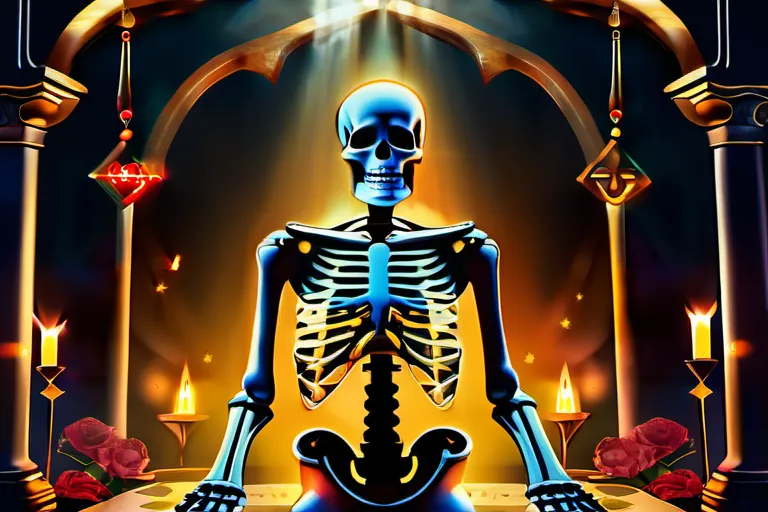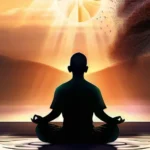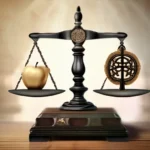Exploring the psychological, cultural, and historical aspects of the fear of death and its role in shaping religious beliefs.
Delve into the fascinating topic of why people believe in an afterlife, as we explore the role that the fear of death plays in the development and maintenance of religious belief systems. From ancient civilizations to modern-day societies, this article will provide a comprehensive understanding of the complex relationship between mortality anxiety and religious beliefs.
The Psychological Roots of the Fear of Death
Have you ever pondered why humans fear death? Is it just a natural response, or does it hold deeper psychological roots? Psychologists have long sought to unravel this mystery, suggesting that our fear of death may stem from an innate desire for self-preservation and a need for security.
Is the fear of death more than just a biological impulse? Perhaps it is a complex mix of emotions, memories, and experiences that we carry with us throughout life. According to Sigmund Freud, humans may repress their fear of death deep within the unconscious mind, only to experience it through anxiety or neurotic symptoms. This idea suggests that our fear might be so profound that it drives us to seek solace in the unknown realm of religion.
But why turn to religion for comfort? Is it merely a coping mechanism or does it offer something more substantial? Some argue that religious beliefs provide a framework for understanding life’s ultimate questions, including the inevitability of death. By imagining an afterlife, humans might find a sense of continuity and purpose beyond their mortal existence.
Could religion be seen as a psychological shield against the fear of non-existence? While this idea is intriguing, it also raises questions about how deeply ingrained our beliefs are in cultural and societal structures. The way different cultures handle death can vary greatly; some societies embrace it with rituals that celebrate life, while others might suppress their grief and anxiety through strict adherence to religious practices.
In essence, the fear of death is a multifaceted issue that touches on both individual psychology and broader cultural narratives. As we explore these complexities, one thing becomes clear: our relationship with religion and mortality is far from simple. It’s a dance between the personal and the collective, where faith might serve as a bridge between the known and the unknown.
The Role of Religion in Coping with Mortality Anxiety
Imagine facing a vast, endless ocean where every wave represents a day of your life. Would you not long for a lighthouse to guide you through the darkness? In many ways, this metaphor encapsulates our deep-seated fear of death—a fear that has driven humanity to seek solace and meaning beyond the confines of mortality.
Throughout history, religion has served as that guiding light, offering a narrative that extends beyond the horizon of our lives. But is it merely a means to alleviate our existential dread? Could the fear of death be the very reason why religious beliefs have taken root in human societies?
Consider the ancient Egyptians with their elaborate funerary practices and belief in an afterlife filled with eternal peace. For them, religion was not just about worshiping gods; it was a way to ensure that life continued beyond the grave. Could this fear of death be the driving force behind such intricate rituals?
Similarly, the Greeks, with their complex pantheon of deities and myths, found comfort in stories that promised heroes a place among the stars after death. These tales provided a sense of continuity and immortality amidst the fleeting nature of life. How does this relate to our own fear of death, and could it be that such narratives have shaped religious practices even today?
The fear of death is not just an individual emotion; it’s a collective human experience that has transcended generations. From the comfort of chanting in Buddhist monasteries to the joyous celebrations at Christian Easter services, religion provides a framework for coping with mortality. Could it be that these communal practices are as much about addressing our deepest fears as they are about praising a divine being?
As we delve deeper into history, we find countless examples of how societies have crafted religious beliefs to address the fear of death. Whether through the worship of nature in ancient cultures or the promise of resurrection in Abrahamic religions, these systems offer answers that resonate with our primal anxieties.
In essence, could it be argued that our very existence as a species is intertwined with the quest for eternal life? And if so, does this mean that religious beliefs are not just a response to fear but also a profound attempt at defining what it means to live?
Ancient Beliefs about the Afterlife
Imagine stepping back into ancient Egypt, where the belief in the afterlife was as intricate and multifaceted as the hieroglyphs that adorned their tombs. The Egyptians feared death but also embraced it, believing it to be a transition rather than an end. They developed elaborate rituals and mummification practices to ensure their souls would travel safely to the Field of Reeds, a paradise where they would live once again with loved ones. This belief system not only offered them comfort in facing mortality but also deeply influenced modern religious practices. Could it be that our fear of death is what first planted the seeds for such profound beliefs? Is it possible that the desire to continue existing beyond this earthly life drives us towards religion?
In ancient Greece and Rome, too, we see a similar dynamic at play. The Greeks, with their pantheon of gods who often mirrored human emotions and desires, offered hope for an afterlife through reincarnation or joining the immortal realm of the dead. Could this belief in a continuous existence be a way to cope with the fear of death? The Romans, influenced by both Greek philosophy and their own unique spiritual practices, developed complex funerary rites that honored the deceased and assured them of a peaceful afterlife. These rituals became integral parts of religious practices that persist in various forms even today.
The fear of death is like a shadow that has followed humanity from the dawn of civilization to the present day. It has shaped our beliefs, influenced our cultures, and driven us towards the comfort of religion. As we explore these ancient beliefs about the afterlife, we see how they not only provided answers but also created new questions. Could it be that by exploring these early religious practices, we can gain a deeper understanding of why humans are so profoundly affected by the fear of death? Is this fear what initially spurred our quest for meaning and purpose beyond life’s fleeting moments?
In the next chapter, we will delve into how these early beliefs have evolved over time, tracing their transformation through history. But for now, let us reflect on these ancient civilizations and the profound impact they had on shaping our own religious and cultural practices.
The Evolution of Religious Beliefs over Time
Is the fear of death a reason for religious belief? Throughout history, this question has echoed through countless minds, like whispers in the dark. The fear of non-existence, the unknown realm beyond our mortal coil, has driven humans to seek solace and answers in the form of religious beliefs about the afterlife.
In ancient times, civilizations often imagined a world where the soul continued its journey. The Egyptians believed in an eternal existence in the Field of Reeds, while the Greeks envisioned the dead wandering in Hades, guided by Prometheus and Demeter. These ideas laid the groundwork for later religious systems that promised a more comforting fate after death. Could it be that these early beliefs were born out of an innate human fear of non-being?
As time marched on, the concept of an afterlife became increasingly complex and varied. In Zoroastrianism, the good and evil choices made in life determined one’s fate in the final judgment. Meanwhile, Buddhism offered a path to liberation from the cycle of rebirth, emphasizing compassion and enlightenment. These shifts in belief reflect evolving cultural values and psychological needs—was it merely fear that pushed humanity towards these varied afterlife concepts? Or were there deeper spiritual yearnings at play?
The evolution of religious beliefs about death can also be seen through the lens of technological advancements and social changes. The Plague in medieval Europe, for instance, led to a surge in religious fervor as communities sought solace in divine protection and eternal peace. Similarly, the Industrial Revolution brought about new fears and anxieties that may have fueled even more complex belief systems. Could it be that these historical turning points were driven not just by fear of death, but also by broader societal transformations?
As we delve deeper into history, one thing becomes clear: the fear of death has played a significant role in shaping religious beliefs. But could this fear have been a catalyst for something greater—perhaps a quest for meaning and understanding that transcends mere survival? The journey through these beliefs about the afterlife reveals not just our fears, but also our profound desire to find answers in an uncertain world.
Modern Perspectives on Death and the Afterlife
How do we navigate the fear of death? Is it merely a psychological response, or does it hold deeper meaning that shapes our beliefs about the afterlife and beyond?
Modern perspectives on death and the afterlife are complex and multifaceted. Scientific theories offer fascinating insights into near-death experiences (NDEs), challenging traditional views of consciousness and existence. For instance, the concept of out-of-body experiences suggests that our awareness may transcend physical boundaries, hinting at a broader understanding of life and death.
Cultural beliefs also play a significant role in shaping perceptions of the afterlife. In many societies, rituals and practices surrounding death are not just about saying goodbye but about embracing the continuity of existence. For example, in some indigenous cultures, there’s a belief that spirits return to guide their descendants, creating a circle of life that extends beyond physical death.
But what if we consider the fear of death as more than just a survival mechanism? Could it be that this fear drives us to seek answers about our existence, propelling us towards religious and spiritual beliefs?
In a world where technology offers glimpses into consciousness and quantum mechanics challenges our understanding of reality, the boundaries between science and spirituality blur. This interplay raises profound questions: Are we merely biological entities, or do our souls continue after death? And if so, what form might that continuation take?
The Future of Religious Beliefs about Death
Will our beliefs about death and the afterlife continue to be shaped by fear, or will they transform as we gain new insights? As societies evolve and scientific discoveries challenge traditional views, could religious beliefs about death and the afterlife shift towards a more rational understanding? Is it possible that, in the future, people might see death not just as an end but as a natural part of the life cycle, much like the seasons?
Consider how global events have already begun to influence our perceptions. The coronavirus pandemic, for instance, has forced many to confront mortality in ways they never imagined. How might this experience alter their beliefs? Will it lead them to seek solace in science and rationality over supernatural explanations?
The future of religious beliefs about death could also be influenced by advancements in neuroscience and technology. If scientists can one day provide empirical evidence for the existence of an afterlife, how might that change the landscape of religious faiths? Conversely, if technologies like cryonics or digital immortality become more viable, what implications will this have on our concepts of life and death?
Moreover, as societies become increasingly interconnected through globalization, cultural exchanges could lead to a blending of beliefs. Will we see a resurgence in polytheistic practices or the emergence of new hybrid religions? How might these changes affect people’s views on the afterlife, especially when faced with diverse interpretations and conflicting narratives?
Finally, let us ponder the role of environmental awareness in shaping future beliefs. As climate change intensifies, could it lead to a reevaluation of death as part of a larger cosmic cycle? Might this perspective foster a greater sense of stewardship and responsibility towards our planet?
The future is uncertain, but one thing is clear: our understanding of death and the afterlife will continue to evolve. How we choose to interpret these concepts in light of new knowledge and changing values will define the religious beliefs of tomorrow.
Conclusion
 By the end of this article, you’ll have gained valuable insights into the psychological, cultural, and historical factors that contribute to the fear of death and its role in shaping religious belief systems. You’ll also be equipped with a deeper understanding of how these beliefs continue to evolve and adapt over time.
By the end of this article, you’ll have gained valuable insights into the psychological, cultural, and historical factors that contribute to the fear of death and its role in shaping religious belief systems. You’ll also be equipped with a deeper understanding of how these beliefs continue to evolve and adapt over time.











